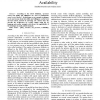1634 search results - page 44 / 327 » Reasoning about Knowledge Using Rough Sets |
MOBIQUITOUS
2007
IEEE
14 years 4 months ago
2007
IEEE
— According to the IETF definition, “presence conveys the ability and willingness of a user to communicate across a set of devices”. In this paper we use semantic techniques ...
JAR
2007
13 years 10 months ago
2007
As applications of description logics proliferate, efficient reasoning with knowledge bases containing many assertions becomes ever more important. For such cases, we developed a n...
SEMWEB
2010
Springer
13 years 4 months ago
2010
Springer
Space and time have not received much attention on the Semantic Web so far. While their importance has been recognized recently, existing work reduces them to simple latitude-longi...
ICFP
2005
ACM
14 years 10 months ago
2005
ACM
We present a foundation for a computational meta-theory of languages with bindings implemented in a computer-aided formal reasoning environment. Our theory provides the ability to...
ICTAI
2007
IEEE
14 years 4 months ago
2007
IEEE
We review a method of generating logical rules, or axioms, from empirical data. This method, using closed set properties of formal concept analysis, has been previously described ...

